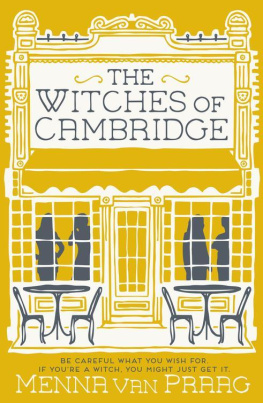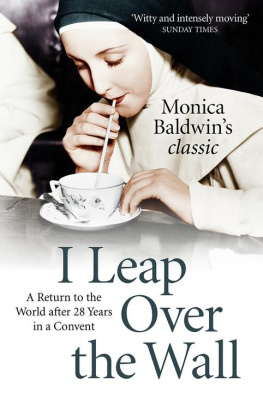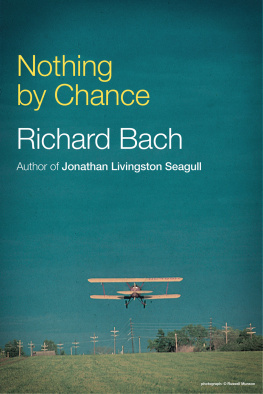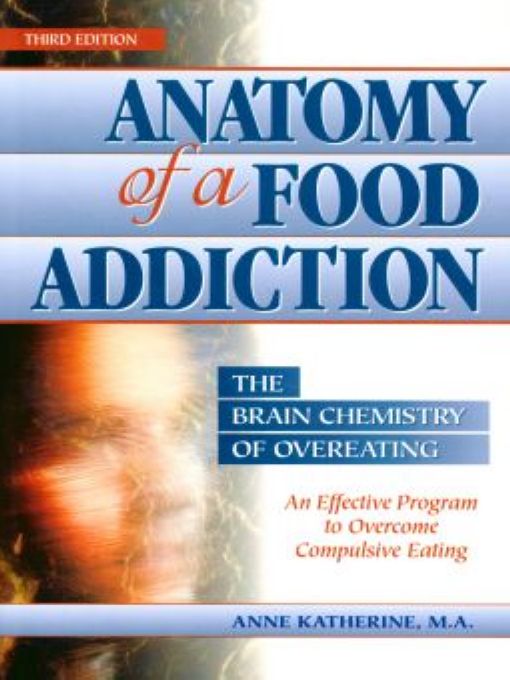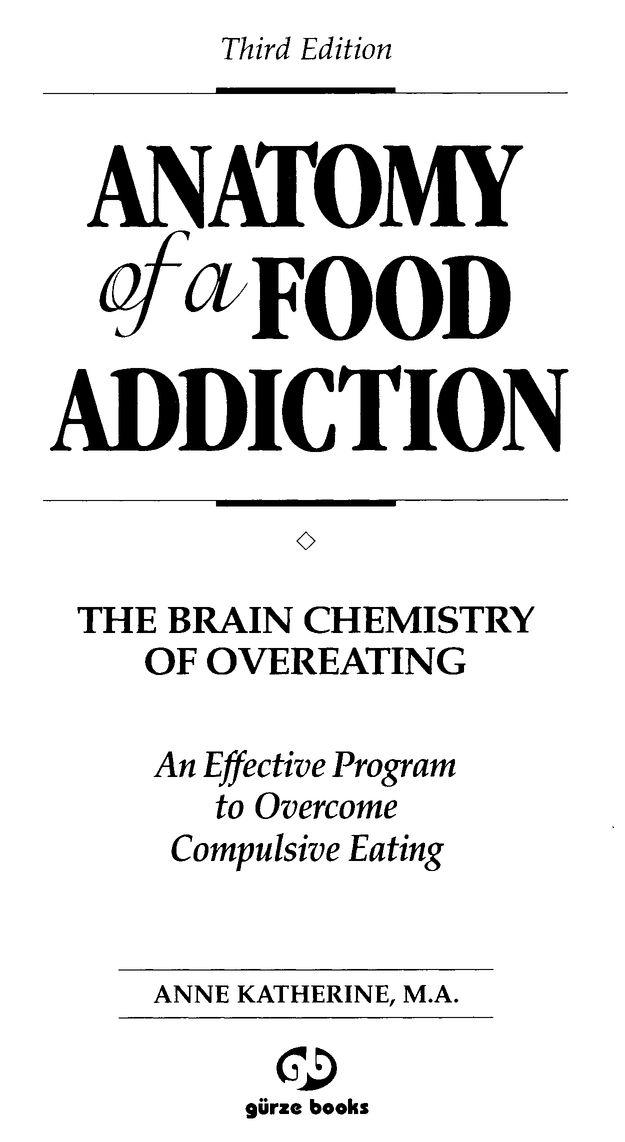Table of Contents
TO MOM
For all women and men whose lives have been strangled by food
ACKNOWLEDGMENTS
Thanks to Cody Sontag, M.A. (JoEllen Wahto); Sherry Ascher, M.A.; May C. Brown, Ph.D.; Alice Delaney, M.A.; Alliene Ellis; Frances West; Vickie Sears; Carol Conner Newman; Kathy Severson, Ph.D.; Amy Condon; Sandy Reno; Bob Reno, Ph.D.; Shirley Averett; and Jean Parker Cobb for soaring support, grand ideas, and faith.
PREFACE
When I took my first step toward recovery from binge eating in 1983, I had no idea that my life was unfulfilled because I was eating too much. What a wonder, then, that with each small step I took into recovery, my life gained more luster, my mind got clearer, and my energy grew.
I didnt realize that certain foods act in the body as if they are drugs, creating an addiction powerful enough to have held me in a pattern of binge eating despite my most fervent and spiritual efforts to break free. I call these foods drug foods, which by themselves are not drugs, but through a series of chemical reactions eventually cause production of brain chemicals that can have a drug-like effect on the body. These chemicals cloud the mind, imprison the soul, and steal freedoms. All this from particular foods in interaction with a particular body type.
This susceptibility stems from the fact that many people have an inadequate supply of certain chemicals that can, among other things, alleviate pain. We learn, even as small children, to stimulate the release of these chemicals by eating sweets and we do this for a much more significant reason than to get a particular taste. We do this because, soon after, we feel better.
Thus, we discover how to manipulate our brain functioning by choosing to eat an abundance of certain types of foods. We make this adjustment without any consciousness of how or why it works; but, over time, such manipulation causes other brain changes, and we can unknowingly get trapped in a cycle of eating that causes more eating. This book explains that process.
If you suspect that you have a food addiction but arent sure, try the test in the Introduction. You may not even realize how much of your life is influenced by drug foods. But if the very idea of giving up sugar seems impossible, if you fear that not having sweets would take all the color out of your life, or you feel that giving up desserts would be the hardest thing you could ever do, you are thinking like a junkie.
Do you have the same kind of emotional attachment to radishes that you do to chocolate? If someone said, Radishes are now extinct and youll never see another one, would it cause much of a ripple in your life? I like radishes and Id miss them if they were gone, but I dont think much about radishes.
Chocolate, on the other hand, can raise passion. And whats the difference between chocolate and radishes? Chocolate is the perfect drug food. Its sweetness ultimately stimulates the release of dreamy brain chemicals, its fat is comforting, and another caffeine-like chemical in chocolate speeds up this whole process while providing a pleasurable reaction of its own. All this can be highly addictive.
A binge eater who is addicted to fat can easily consume a bag of regular potato chips, continuing to eat even after feeling full. However, the same person will get bored chewing healthy, nonfat chips. If theres no internal relief, whats the point? Whats more, a food addict knows which foods hold a charge and which do not. No matter how good is the taste of the healthier version, the food that brings the sought-after bodily experience will be the one chosen.
I challenge you. Buy a package of baked, nonfat potato chips. Some taste better than others. Be sure you get chips that are potatoes only, not ground up potatoes with some form of sugar added. Better yet, try making your own from the following tasty recipe. Slice potatoes thin, spray with vegetable spray, sprinkle with Cajun or other seasoning, and bake, turning as needed. Do you eat the whole batch and want more, or find it half-full in the pantry six months later? What about regular chips?
Place a jar of nonfat mayo next to the regular mayo in the fridge. Which jar gets empty first? Which cereal calls loudest, frosted flakes or shredded wheat? Which frozen desert has that special glow around ita nonfat, truly sugar-free, lightly fruit-sweetened frozen yogurt or the regular stuff? Do you know instincitvely which foods would draw you?
When I first started talking to clients in 1985 about their addiction to food, I had only a few uncorroborated studies to go on. When I wrote this book in 1987, I sought out obscure research reports from diverse disciplines, most of which werent linked to each other. I made those links as I wrote. On the one hand, I knew I was climbing way out on a long limb. On the other hand, I knew from my own internal experience just how compelling a food craving can be, how powerful and irresistible.
Up till then, my food addiction had seemed like a curse, preventing me from feeling like a normal person. But when I understood that my experience was proof that food could be addictive, it helped me stand firm when I came under attack by some psychologists that said this was absolutely not possible. I knew that my relationship with certain foods was not normal. I knew that my thinking and obsessing, planning and hoarding, sneaking and hiding resembled the behavior of an addict. I also knew that only when I stopped eating the foods and quantities that kept me in a hazy prison, could I develop a normal relationship with food. Till then, drug foods acted just as addictive drugs do, they stimulated the desire for more. Finally, I knew that if I was food addicted, then others probably were, too.
Now, many of the original research studies on brain chemicals that regulate appetite have been abundantly replicated, and the effect of depletion of certain chemicals on eating is well-documented. Ive worked with hundreds of binge eaters, some of whom have strong addictions to many foods, others who have mild addictions to some foods. Still others are addicted to the process of eating, capable of consuming large amounts of any food. All of them, however, have been helped by an understanding of the brain chemistry of eating and the practice of abstinence. I can safely crawl back from my limb and be grateful that I trusted my instincts.
Some people want to know if I lost weight as a result of my recovery. Well, what about weight? Is this a book about weight loss? No. Its a book that will tell you how to move drug foods out of your life and make room for clarity of mind and personal choice to move back in.
In fact, weight is an extremely complex issue, and worrying about ones weight is not helpful in recovery from food addiction. Focusing on weight loss creates tension that, more often than not, propels most people to binge. Focusing on recovery, though, creates moment-by-moment awareness, inner guidance, choice, and healthier alternatives. Actually, one can be in recovery and choose not to be concerned with weight loss at all, but few can sustain a weight loss without the long-term benefits of deep recovery.
In many ways, recovery from food addiction is a much more subtle process than, for instance, recovery from alcohol addiction which is much more clear cutabstain from alcohol. A food addict


